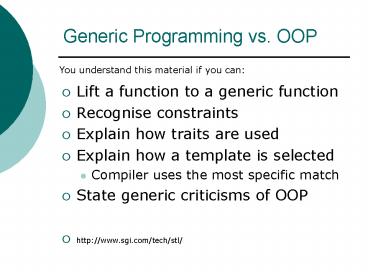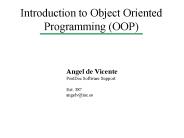Generic Programming vs' OOP - PowerPoint PPT Presentation
1 / 22
Title:
Generic Programming vs' OOP
Description:
Explain how a template is selected. Compiler uses the most specific match ... select increment or decrement. Using Traits 2: Tag Dispatching. Dispatching ... – PowerPoint PPT presentation
Number of Views:29
Avg rating:3.0/5.0
Title: Generic Programming vs' OOP
1
Generic Programming vs. OOP
- Lift a function to a generic function
- Recognise constraints
- Explain how traits are used
- Explain how a template is selected
- Compiler uses the most specific match
- State generic criticisms of OOP
- http//www.sgi.com/tech/stl/
2
Concept
- A frequently used set of requirements.
- Used by several different algorithms.
- Describes a logical abstraction
- Container, iterator, assignable
- A type can model the concept
- If it satisfies the constraints
- E.g. int models a random access iterator
- A Concept is like an abstract class
- Defines behaviour
- But not currently built into the language
- Not properly supported by compiler
3
Lifting Example memcpy()
- int memcpy(int dest, const int source, int
size) - const int first source
- const int last source size
- char result (char)dest
- while (first ! last)
- dest first
- return result
- integer by integer copy
- Regions defined by pointer size
- Requirements
- can compare pointers
- can dereference pointers (for read and write)
- can increment pointers
- can add an item of type int to a pointer
4
Generalising memcpy() iterators
- Using void lets the function copy any array
- But what if the data is in a linked list?
- Can we generalize to any sequence of elements?
- The minimal requirements are to
- Traverse the sequence using some sort of pointer
- Access elements pointed to (input)
- Write the elements to the destination (output)
- Compare pointers to know when to stop.
- Relevant concepts
- Input Iterator read only
- Output Iterator write only
5
Memcpy() as a function template
- template parameters constrained
- Input Output Iterator concepts
- A reusable Memcpy() function
- template lttypename IIterator, typename OIteratorgt
- OIterator memcpy(IIterator f, IIterator l,
OIterator dst) - OIterator result dst
- while (f ! l)
- dst f
- return result
The programmer must ensure these types are
instantiated to something obeying these
constraints. The compiler can only check some
constraints automatically.
e.g. cant check complexity constraints
6
Traits Class
- Helper class templates
- Information on a compile-time entity
- Consistent format
- E.g. stditerator_traitsltTgt
- template ltclass Iteratorgt
- struct iterator_traits
- typedef ... iterator_category
- typedef ... value_type
- typedef ... difference_type
- typedef ... pointer
- typedef ... reference
- An introduction to C Traits (http//thad.notagot
h.org/cpptraits_intro/)
can help select more efficient algorithms dependin
g on the iterator's capabilities
the type the iterator "points at.
7
Using Traits
Concepts
- sum() uses iterator_traits to find value_type.
- // Requirements IteratorltIgt, Addableltvalue_typegt,
- // Assignableltvalue_typegt, CopyConstructibleltvalue
_typegt - // 0 assignable to value_type
- templatelttypename Igt
- iterator_traitsltIgtvalue_type sum(I start, I
end) - typename iterator_traitsltIgtvalue_type init
0 - for (I pos start pos ! end pos)
- init init pos
- return init
value_type items must have operator What if it
only has ? Could say init pos Whats the
problem with this?
8
Traits take it or leave it
- traits templates are non-intrusive
- Can associate information with any type
- built-in types
- types defined in third-party libraries,
- Can define for a particular type by specializing
the traits template. - E.g stdnumeric_limitsltTgt
- Provides constants describing the range and
capabilities of numeric types.
9
Using Traits average of an array
- templatelttypename Tgt
- struct average_traits
- typedef T average_type
- template ltint size, typename Tgt
- average_traitsltTgtaverage_type average(T
data) - typename average_traitsltTgtaverage_type
total0 - int num 0
- const int lim size / sizeof(T)
- while(num lt lim)
- total datanum
- return total/num
10
Using Traits average 2
templateltgt struct average_traitsltintgt typedef
float average_type
The mean of 1.9 2.9 3.9 4.9 is 3.4 The mean of
1 2 3 4 is 2 Press any key to continue
The mean of 1.9 2.9 3.9 4.9 is 3.4 The mean of
1 2 3 4 is 2.5 Press any key to continue
- int main(int argc, char argv)
- double ddata 1.9, 2.9, 3.9, 4.9
- double mean averageltsizeof(ddata)gt(ddata
) - int idata 1, 2, 3, 4
- mean averageltsizeof(idata)gt(idata)
11
Specifying traits
Specialisation is a useful technique, that can be
used to provide a more efficient implementation
of a general algorithm for a particular type. It
can be used with function templates as well as
class templates.
average_traitsltdoublegt
average_traitsltintgt
- Specialization links traits with a type
- templatelttypename Tgt
- struct average_traits
- typedef T average_type
- templateltgt
- struct average_traitsltintgt
- typedef double average_type
average_traitsltdoublegt
This is a specialisation of the average_traits
template
average_traitsltintgt
Picked because it is more specific
12
Using Traits stdadvance()
- stdadvance()
- increments an iterator n times.
- Optimizations depend on iterator type
- Random access use i n
- Very efficient constant time.
- Other iterators must be stepped (so linear)
- Bidirectional
- n can be negative
- select increment or decrement
13
Using Traits 2 Tag Dispatching
- Dispatching
- Selecting one operation from many
- Tag
- A property used in dispatching.
- advance()
- gets iterator_category from iterator_traits
- call overloaded dispatch()
- selected automatically by the compiler
- based on the iterator_category tag
14
Default dispatch
- namespace std
- struct ii_tag
- struct bidi_tag
- struct ra_tag
- namespace detail
- template ltclass IIterator, class Steps gt
- void dispatch(IIterator i, Steps n, ii_tag)
- while (n--) i
Ive abbreviated these Names from the STL
This parameter isnt used in the function its
just a cunning way to force the compiler to
select the appropriate version of dispatch
15
BidirectionalIterator dispatch
Compiler will pick this version of dispatch if
the third parameter is of this type
- template ltclass BidiIterator, class Stepsgt
- void dispatch(BidiIterator i, Steps n,
bidi_tag) - if (n gt 0)
- while (n--) i
- else
- while (n) --i
Need to know if the direction is positive or
negative and handle properly
16
RandomAccessIterator dispatch
- template ltclass RAIterator, class Stepsgt
- void dispatch(RAIterator i, Steps n, ra_tag)
- i n
- //End namespace detail
Random Access Iterator Efficient constant time
17
Using Traits advance
A dummy variable, only its type is important
- template ltclass IIter, class Stepsgt
- void advance(IIterator i, Steps n)
- typename iterator_traitsltIItergtiterator_catego
ry id - detaildispatch(i, n, id)
- //End namespace std
Tells the compiler iterator_category is a
type. It could be a static variable
The compiler will optimise away the dummy variable
Compiler will pick appropriate version of
dispatch based on type of id
18
Defining traits
- Could define trait properties inside the
described class - Only works for new classes
- What about pointers? valid iterator need
traits - STL use a template parameterized by iterator
- template ltclass Iteratorgt
- struct iterator_traits
- typedef typename Iteratorvalue_type
value_type - // ...
- The value type is
- iterator_traitslt iteratorltsetgt gtvalue_type.
The space is vital why?
Compilers lexical analyser will recognise it as
gtgt operator generate error
19
Defining traits by specialisation
- For pointers
- create a specialized version
- template ltclass Tgt
- struct iterator_traitsltTgt
- typedef T value_type
- // ...
- Use specialisation for C-pointer
- e.g. int,
- iterator_traitslt int gtvalue_type.
20
OOP unsound?
- OOP
- starts with classes.
- analyses the world using interfaces that vary on
a single type - Real problems need families of interfaces that
span multiple types. - Programming starts with algorithms
- Understand the algorithm
- Then design an appropriate interface
http//www.stlport.org/resources/StepanovUSA.html
An Interview with A. Stepanov by Graziano Lo
Russo
21
What OO cant do
- You can't write a generic max()
- two arguments and result of same type
- template ltclass Ordered gt
- inline const Ordered max(const Ordered x,
const Ordered y) - return x lt y ? y x
- If OO cant implement max or swap or linear
search, what is it good for? - Why C is not just an Object-Oriented
Programming Language (1995) Bjarne Stroustrup
22
Summary
- Lifting
- Modify generalise an algorithm
- Minimise constraints
- Template Specialisation
- Compiler picks most specific template
- Efficiency with flexibility
- Traits
- Programming technique
- Separate class
- Has compile-time info about a data type































